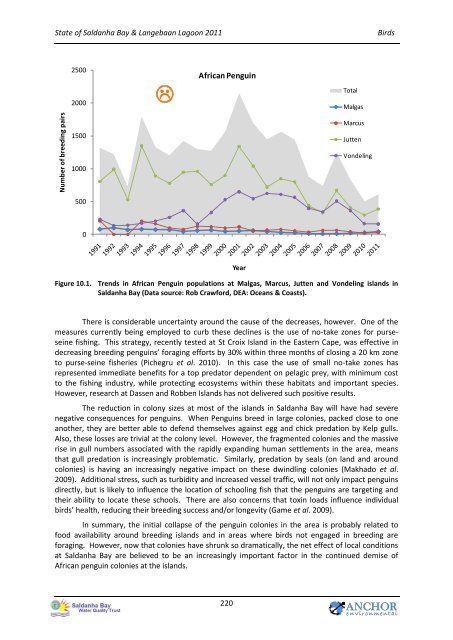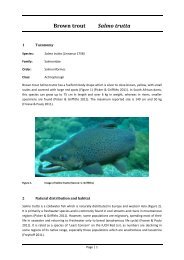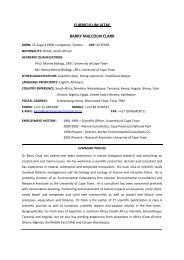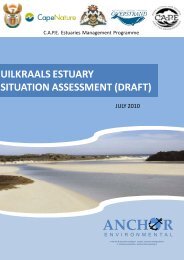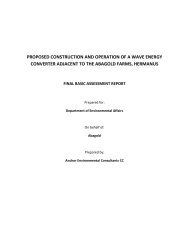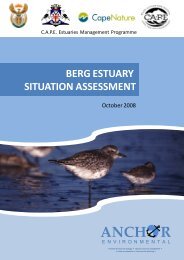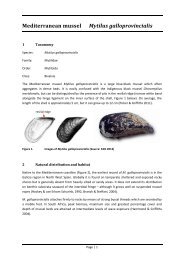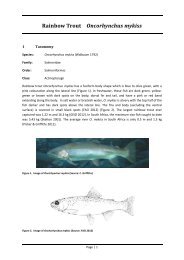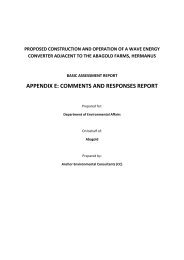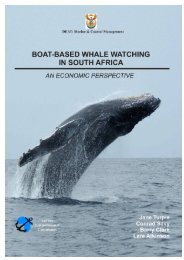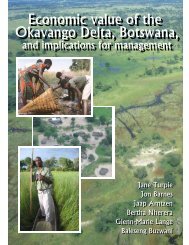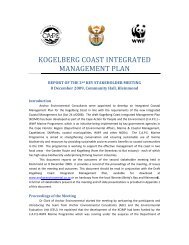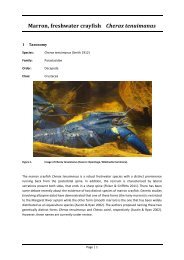State of the Bay Report 2011-Final.pdf - Anchor Environmental
State of the Bay Report 2011-Final.pdf - Anchor Environmental
State of the Bay Report 2011-Final.pdf - Anchor Environmental
Create successful ePaper yourself
Turn your PDF publications into a flip-book with our unique Google optimized e-Paper software.
Number <strong>of</strong> breeding pairs<br />
<strong>State</strong> <strong>of</strong> Saldanha <strong>Bay</strong> & Langebaan Lagoon <strong>2011</strong><br />
Birds<br />
2500<br />
African Penguin<br />
2000<br />
Total<br />
Malgas<br />
1500<br />
1000<br />
Marcus<br />
Jutten<br />
Vondeling<br />
500<br />
0<br />
Figure 10.1. Trends in African Penguin populations at Malgas, Marcus, Jutten and Vondeling islands in<br />
Saldanha <strong>Bay</strong> (Data source: Rob Crawford, DEA: Oceans & Coasts).<br />
Year<br />
There is considerable uncertainty around <strong>the</strong> cause <strong>of</strong> <strong>the</strong> decreases, however. One <strong>of</strong> <strong>the</strong><br />
measures currently being employed to curb <strong>the</strong>se declines is <strong>the</strong> use <strong>of</strong> no-take zones for purseseine<br />
fishing. This strategy, recently tested at St Croix Island in <strong>the</strong> Eastern Cape, was effective in<br />
decreasing breeding penguins’ foraging efforts by 30% within three months <strong>of</strong> closing a 20 km zone<br />
to purse-seine fisheries (Pichegru et al. 2010). In this case <strong>the</strong> use <strong>of</strong> small no-take zones has<br />
represented immediate benefits for a top predator dependent on pelagic prey, with minimum cost<br />
to <strong>the</strong> fishing industry, while protecting ecosystems within <strong>the</strong>se habitats and important species.<br />
However, research at Dassen and Robben Islands has not delivered such positive results.<br />
The reduction in colony sizes at most <strong>of</strong> <strong>the</strong> islands in Saldanha <strong>Bay</strong> will have had severe<br />
negative consequences for penguins. When Penguins breed in large colonies, packed close to one<br />
ano<strong>the</strong>r, <strong>the</strong>y are better able to defend <strong>the</strong>mselves against egg and chick predation by Kelp gulls.<br />
Also, <strong>the</strong>se losses are trivial at <strong>the</strong> colony level. However, <strong>the</strong> fragmented colonies and <strong>the</strong> massive<br />
rise in gull numbers associated with <strong>the</strong> rapidly expanding human settlements in <strong>the</strong> area, means<br />
that gull predation is increasingly problematic. Similarly, predation by seals (on land and around<br />
colonies) is having an increasingly negative impact on <strong>the</strong>se dwindling colonies (Makhado et al.<br />
2009). Additional stress, such as turbidity and increased vessel traffic, will not only impact penguins<br />
directly, but is likely to influence <strong>the</strong> location <strong>of</strong> schooling fish that <strong>the</strong> penguins are targeting and<br />
<strong>the</strong>ir ability to locate <strong>the</strong>se schools. There are also concerns that toxin loads influence individual<br />
birds’ health, reducing <strong>the</strong>ir breeding success and/or longevity (Game et al. 2009).<br />
In summary, <strong>the</strong> initial collapse <strong>of</strong> <strong>the</strong> penguin colonies in <strong>the</strong> area is probably related to<br />
food availability around breeding islands and in areas where birds not engaged in breeding are<br />
foraging. However, now that colonies have shrunk so dramatically, <strong>the</strong> net effect <strong>of</strong> local conditions<br />
at Saldanha <strong>Bay</strong> are believed to be an increasingly important factor in <strong>the</strong> continued demise <strong>of</strong><br />
African penguin colonies at <strong>the</strong> islands.<br />
220<br />
ANCHOR<br />
e n v i r o n m en t a l


